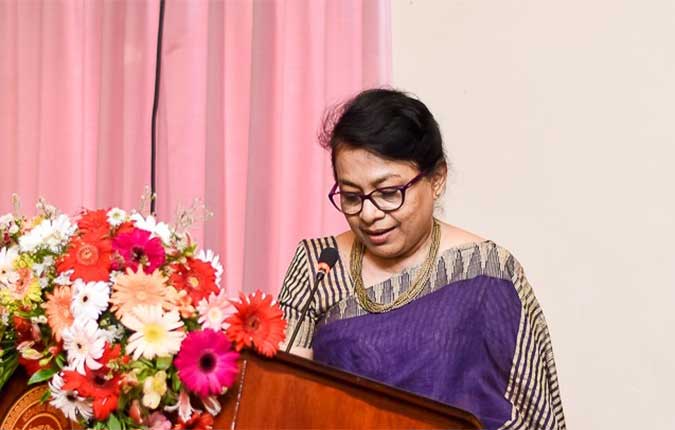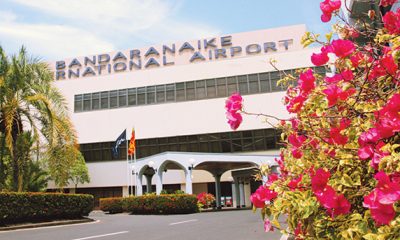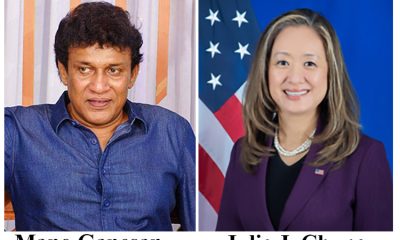News
Prof. Udagama: SL will soon have to answer for toll from economic woes and lack of representative governance

By Rathindra Kuruwita
When the next Human Rights Council session comes up, Sri Lanka would have to present the steps it has taken to ensure the welfare of those affected by economic reforms, former head of the Human Rights Commission of Sri Lanka (HRCSL) Prof. Deepika Udagama said, addressing the media recently.
There was hardly any focus on economic and social rights in Sri Lanka as most people and successive governments had associated rights with civil and political issues, she said.
In the past, the United Nations Human Rights bodies had also focused on disappearances, torture, killings, arbitrary arrests, and similar issues during the conflict with the LTTE and youth uprisings in the South, she said.
“However, there is a focus again on all facets of people’s rights. There are many economic crises around the world these days, not only in Sri Lanka. When we look at Sri Lanka, we see many of our rights violated due to the economic crisis. There are problems with the right for food security, education, healthcare, and mobility,” she said.Prof. Udagama said that economic and social rights were bound to civil and political rights.
“As you know, the better educated individuals are less likely to be harassed by the police. The United Nations had stated that the Sri Lankan government had to take proactive measures to assist those affected by the economic crisis and have lost their economic rights,” she said.
Prof. Udagama said that poverty often led to the violation of all human rights. The economic reforms carried out by the government were adversely affecting the vulnerable segments of society and they needed safety nets.
“Sri Lanka had to seek IMF assistance because the rulers of the country created an economic crisis. The UN itself spoke about how corruption and other economic crimes are affecting Sri Lanka. When we implement IMF policies, everyone knows that the poor suffer. The Sri Lankan government has a great responsibility to protect these people,” she said, adding that there was a lot of controversy about the Aswesuma welfare programme because those who really needed government assistance had not been included as beneficiaries.
“This is discrimination, and this happens because the selection process is politicised. Most of our problems can be linked to our governance issues,” she said.
“It is also very clear that most of the MPs no longer have legitimacy in people’s eyes. What is the way out of this if Sri Lanka doesn’t have elections? How does the government ensure public buy-in for the tough policies it has to enact? It needs strong public representation,” she said.
The government claimed that there was political stability because there were no protestors on the roads, Prof. Udagama said. However, whether political stability could be artificially created was a question that would be answered sooner rather than later, she said.
“There are also questions about the nature of our ‘independent’ bodies. For democratic rule, we need the mandate of the people. We need elected representatives, and for that, we need elections. And we know that elections will only be free and fair if there are independent bodies to oversee them. The government can’t say that this is purely an economic crisis that the Ministry of Finance, the Treasury, and the Central Bank can solve. However, the problem is broader and is linked to governance,” she said.
News
US sports envoys to Lanka to champion youth development

The U.S. Embassy in Colombo welcomed the U.S. Sports Envoys to Sri Lanka, former National Basketball Association (NBA) and Women’s National Basketball Association (WNBA) players Stephen Howard and Astou Ndiaye, from June 8 through 14.
The Public Diplomacy section of the U.S. Embassy said that it would launch a weeklong basketball program intended to harness the unifying power of sports, made possible through collaboration with Foundation of Goodness and IImpact Hoop Lab.
While in Sri Lanka, Howard and Ndiaye, both retired professional basketball players, will conduct a weeklong program, Hoops for Hope: Bridging Borders through Basketball. The Sports Envoys will lead basketball clinics and exhibition matches and engage in leadership sessions in Colombo and Southern Province for youth aged 14-18 from Northern, Uva, Eastern and Western Provinces, offering skills and leadership training both on and off the court. The U.S. Envoys will also share their expertise with the Sri Lanka Basketball Federation, national coaches, and players, furthering the development of basketball in the country. Beyond the clinics, they will collaborate with Sri Lankan schoolchildren to take part in a community service project in the Colombo area.
“We are so proud to welcome Stephen and Astou as our Sports Envoys to Sri Lanka, to build on the strong people-to-people connections between the United States and Sri Lanka,” said U.S. Ambassador Julie Chung. “The lessons that will be shared by our Sports Envoys – communication, teamwork, resilience, inclusion, and conflict resolution – are essential for leadership development, community building, equality, and peace. The U.S. Sports Envoy program is a testament to our belief that sports can be a powerful tool in promoting peace and unity.”
News
Rahuman questions sudden cancellation of leave of CEB employees

SJB Colombo District MP Mujibur Rahuman in parliament demanded to know from the government the reasons for CEB suspending the leave of all its employees until further notice from Thursday.
MP Rahuman said that the CEB has got an acting General Manager anew and the latter yesterday morning issued a circular suspending leave of all CEB employees with immediate effect until further notice.
“We demand that Minister Kanchana Wijesekera should explain this to the House. This circular was issued while this debate on the new Electricity Amendment Bill was pending. There are many who oppose this Bill. The Minister must tell parliament the reason for the urge to cancel the leave of CEB employees,” the MP said.However, Speaker Mahinda Yapa Abeywardena prevented Minister Wijesekera responding to the query and said that the matter raised by MP Rahuman was not relevant.
News
CIPM successfully concludes 8th Annual Symposium

The Chartered Institute of Personnel Management (CIPM) successfully concluded the 8th Annual CIPM Symposium, which took place on 31st May 2024. Themed “Nurturing the Human Element—Redefining HRM in a Rapidly Changing World,” the symposium underscored the pivotal role of human resource management (HRM) in today’s dynamic global landscape. Since its inception in 1959, CIPM has been dedicated to advancing the HR profession through education, professional development, and advocacy, solidifying its position as Sri Lanka’s leading professional body for HRM.
Ken Vijayakumar, the President of the CIPM, graced the occasion as the chief guest. The symposium commenced with the welcome address by the Chairperson, Prof. Arosha Adikaram, followed by the Web Launch of the Symposium Proceedings and Abstract Book by the CIPM President. The event featured distinguished addresses, including a speech by Chief Guest Ken Vijayakumar, President of CIPM, and an address by Guest of Honor Shakthi Ranatunga, Chief Operating Officer of MAS Holdings Pvt. Ltd., Sri Lanka.
The symposium also featured an inspiring keynote address by Prof. Mario Fernando, Professor of Management and Director of the Centre for Cross Cultural Management (CCCM) at the University of Wollongong, Australia.
Vote of Thanks of the inauguration session was delivered by Dr. Dillanjani Weeratunga, Symposium Co-chair.
The symposium served as a comprehensive platform for researchers to present their findings across a wide range of critical topics in HRM. These included Cultural Diversity and Inclusion, Talent Development and Retention, Ethical Leadership and Corporate Social Responsibility, Adapting to Technological Advancements, Mental Health and Well-being at Work, Global Workforce Challenges, Employee Empowerment, and Reskilling and Upskilling.
The plenary session was led by Prof. Wasantha Rajapakse. Certificates were awarded to the best paper presenters during the valedictory session, followed by a vote of thanks delivered by Kamani Perera, Manager of Research and Development.
The annual symposium of CIPM was a truly inclusive event, attracting a diverse audience that spanned undergraduates, graduates, working professionals, research scholars and lecturers. This widespread interest highlights the symposium’s significance in the field of HRM, offering a unique opportunity for everyone to network and learn from scholarly brains.The CIPM International Research Symposium was sponsored by Hambantota International Port, Sri Lanka Institute of Information Technology (SLIIT), E B Creasy & Co. PLC, and Print Xcel Company.
























